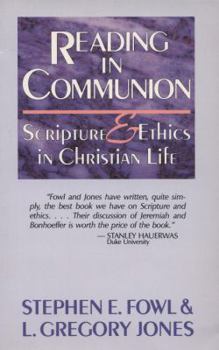Reading in Communion: Scripture and Ethics in Christian Life
Select Format
Select Condition 
Book Overview
No Synopsis Available.
Format:Paperback
Language:English
ISBN:0802805973
ISBN13:9780802805973
Release Date:January 1991
Publisher:William B. Eerdmans Publishing Company
Length:166 Pages
Weight:0.05 lbs.
Dimensions:0.5" x 5.3" x 8.5"
Customer Reviews
3 ratings
Reading in Communion
Published by Thriftbooks.com User , 15 years ago
The importance of Scripture for Christian ethics gains clarity in Reading in Communion: Scripture & Ethics in Christian Life, by Stephen E. Fowl and L. Gregory Jones (Grand Rapids: William B. Eerdmans, c. 1991). Their thesis is simple: "The vocation of Christians is to embody Scripture in the various contexts in which they find themselves" (p. 1). They cite with approval the words of St Augustine, who believed one "'speaks more or less wisely to the extent that he has become more or less proficient in the Holy Scriptures'" (p. 34). Though Scripture principally reveals the Reality of God, not moral imperatives, it still contains vital precepts which should challenge Christians to follow certain patterns. Scripture, however, must be read and interpreted with others--in communion. The authors openly discard what some Protestants take as their birthright: the "private interpretation" of the Bible. Communities--particularly communities suffering persecution of some sort--clearly hear and heed biblical injunctions. To a degree, at least, this is because, the authors contend, the text itself does not contain abiding truth--rather we come to truth as we "encounter" Scripture (p. 31). In community, in church, we encounter Scripture as hearers, differing from the more critical, detached approach taken by academicians. Here St Athanasius wrote wisely: "'For the searching and right understanding of the Scriptures there is need of a good life and a pure soul, and for Christian virtue to guide the mind to grasp, so far as human nature can, the truth concerning God the Word. One cannot possibly understand the teaching of the saints unless one has a pure mind and is trying to imitate their life'" (p. 63). Biblical scholars have their role to play, but all too often today the character of the scholar, the devotional life of the scholar, has no bearing on his professorial career. Though scholars may attain acclaim in the professorial guild, the Church must always insist that the text cannot be mechanically reduced to history and philology. Reading Scripture in communion, following its teachings, we should become "people of character" as the Holy Spirit enables us to live out its message. To rightly hear the truth of Scripture, however, one must also hear the voices one's contemporaries, especially "outsiders," groups such as homosexuals, Jews, and non-Christians. We should, Fowl and Jones say, carefully listen to them, empathize with them, respect them, and open our arms to friendship with them. A modern model for listening to strangers, the authors contend, resides in Dietrich Bonhoeffer, who turned from studying Scripture as a university professor to seeking its guidance and obeying it as a disciple. He turned from reading Scripture "for himself" to reading it "over-against himself" (p. 140). In a 1935 letter to his brother, Bonhoeffer wrote: "'The restoration of the Church must surely depend on a new kind of monastic
Little to add
Published by Thriftbooks.com User , 17 years ago
I can add little to the comprehensive review above. From a Lutheran perspective, and ethical point of view, it is a must read for the fomation of community and character. In my estimation it is weak sacramentally, which is where I believe ethics flow from, however there are many, many fine insights in this work. Anyone serious about Christian ethics should read this book.
Best book on practical hermenutics
Published by Thriftbooks.com User , 20 years ago
It's a shame that this book is no longer in print. There is no book I would recommend higher regarding hermeneutics. This book does not deal with the philosophical and technical questions that leave most people bewildered when thinking about the relation of scripture to our life today, but focuses instead on the importance of wisdom and character in our reading of the text in our churches. Hauerwas was right, the chapters on Bonhoeffer and Jeremiah are worth the price of the book alone. I recommend that you scour used book stores to find this book.






